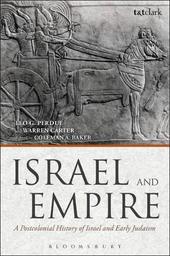
|
Israel and Empire: A Postcolonial History of Israel and Early Judaism
Paperback / softback
Main Details
| Title |
Israel and Empire: A Postcolonial History of Israel and Early Judaism
|
| Authors and Contributors |
By (author) Leo G. Perdue
|
|
By (author) Prof. Warren Carter
|
|
Volume editor Dr Coleman A. Baker
|
| Physical Properties |
| Format:Paperback / softback | | Pages:344 | | Dimensions(mm): Height 234,Width 156 |
|
| Category/Genre | Biblical studies
Judaism |
|---|
| ISBN/Barcode |
9780567243287
|
| Classifications | Dewey:221.601 |
|---|
| Audience | | Postgraduate, Research & Scholarly | |
|---|
|
Publishing Details |
| Publisher |
Bloomsbury Publishing PLC
|
| Imprint |
T.& T.Clark Ltd
|
| Publication Date |
20 November 2014 |
| Publication Country |
United Kingdom
|
Description
This book is open access and available on www.bloomsburycollections.com. It is funded by Knowledge Unlatched. Israel and Empire introduces students to the history, literature, and theology of the Hebrew Bible and texts of early Judaism, enabling them to read these texts through the lens of postcolonial interpretation. This approach should allow students to recognize not only how cultural and socio-political forces shaped ancient Israel and the worldviews of the early Jews but also the impact of imperialism on modern readings of the Bible. Perdue and Carter cover a broad sweep of history, from 1300 BCE to 72 CE, including the late Bronze age, Egyptian imperialism, Israel's entrance into Canaan, the Davidic-Solomonic Empire, the Assyrian Empire, the Babylonian Empire, the Persian Empire, the Greek Empire, the Maccabean Empire, and Roman rule. Additionally the authors show how earlier examples of imperialism in the Ancient Near East provide a window through which to see the forces and effects of imperialism in modern history.
Author Biography
Leo G. Perdue was formerly President and Professor of Hebrew Bible at Brite Divinity School, USA. Warren Carter is Professor of New Testament at Brite Divinity School, USA. Coleman A. Baker is Program Manager of Brite Divinity School's Soul Repair Center and Adjunct Professor at Texas Christian University, USA.
ReviewsThis volume serves as a useful guide to the discipline ... for readers who want to know more about what postcolonialism is and how it might be applied to study of the Bible ... This will be a good introduction to the subject for students and scholars for whom the subject is new. -- Lester L. Grabbe, University of Hull * Theology, 118.3 * [This] text is strong in the amount of data the authors assemble and digest. * The Heythrop Journal * Anyone who is interested in the debate about empires and colonies and the problems associated with them should read this book and reflect on the menacing impact of colonialism. Written by two significant practitioners in biblical studies, this volume for the first time scrutinizes all the biblical empires under one cover. Paying close attention to detail, the authors handle the complex textual and especially postcolonial theoretical issues with responsibility, authority and care. The result is a deceptively sharp and striking volume. This book rightfully calls us to review our ideas and reframe our deepest questions about colonialism, decolonization and neo-colonialism. * R.S.Sugirtharajah, University of Birmingham, UK * A fresh reading of Israel's historiography from the Assyria to the Roman periods. Sweeping in its scope, this volume highlights the contested power dynamics between colonizer and colonized, offering a nuanced interpretation of history and writing that goes beyond the usual emphasis on the elite. Drawing on a range of postcolonial theories, this book offers a helpful counterbalance through its perspective. Well worth the read. -- Elizabeth Boase, Flinders University, Australia Israel and Empire presents a very helpful survey of the imperial conquest and rule of Judah/ Judea/ Israel by the succession of empires from the Assyrians to the Romans. In addition to a summary of key figures and events, Perdue and Carter provide analysis of the political, economic, and cultural aspects of the relations between imperial rulers and the (client) rulers and other elite of Judea. The "reciprocal" relations and cultural expressions of the Judean elite they interpret as historical illustrations of key concepts of postcolonial criticism such as "ambivalence," "hybridity," and "mimicry." They draw tellingly on many recent studies by historians on aspects of the ancient Near Eastern, Hellenistic, and Roman empires to illuminate the imperial situations assumed and addressed in "biblical" and other Judean texts. Israel and Empire brings important illumination of how the Judean aristocracy and scribal circles negotiated the complexities particularly of the Hellenistic and Roman empires. -- Richard Horsley, University of Massachusetts, USA Warren Carter and Leo Perdue bring their experience in postcolonial historiography to a book that is accessible for students. The book helps the reader uncover the use of rhetorics of oppression to designate difference as the foundation for power disparity from the biblical past. But it does so in a way that invites the reader to become 'a verbal cosmopolitan', namely a person who understands how the characterization of history has been used to legitimize power relationships in the past and present. If you engage with the arguments in this book is can facilitate in the transition from a politics of blame to the politics of resistance. -- Stephen B. Reid, George W. Truett Theological Seminary, USA This book from Perdue and Carter is akin to a university textbook, designed more for students and researchers. It has the advantage of taking often scattered information and using it to offer an overview of the confrontation between Israel and the empires of antiquity. -- Katell Berthelot * Revue des Etudes Anciennes [Bloomsbury Translation] *
|